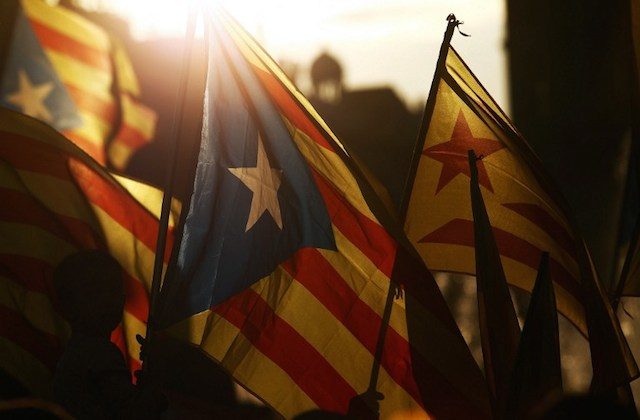SUMMARY
This is AI generated summarization, which may have errors. For context, always refer to the full article.

MADRID, Spain – Spanish King Juan Carlos’ abdication revived anti-royalist fervor in the young democracy, sending thousands into the streets clamoring for a referendum on the monarchy itself.
Rather than hand over the 76-year-old monarch’s throne to his more popular son, the future King Felipe VI, leftist political parties and anti-monarchist protesters demanded a vote on the survival of the institution.
Republican sentiment remains widespread in Spain, which only restored the monarchy in 1975 after the death of General Francisco Franco, who had ruled for four decades.
“I think the monarchy has the support of the great majority in Spain,” Prime Minister Mariano Rajoy said when asked about calls for a referendum on the future of the monarchy.
“Propose a constitutional reform if you don’t like this constitution. You have the perfect right to do so. But what you cannot do in a democracy is bypass the law,” Rajoy told a conference in Madrid.
Spain’s 1978 constitution, which established a parliamentary democracy with the king as a mostly ceremonial head of state, was supported by a great majority in a referendum at the time, the prime minister said.
‘A bit archaic’
Yet late into the night after the king’s abdication announcement Monday, thousands of people filled Madrid’s central Puerta del Sol square as rallies were called in major cities around the country.
Protesters filled the square and police closed access to the royal palace just a short walk away from the demonstration.
“Tomorrow, Spain will be a republic!” chanted crowds of demonstrators brandishing placards reading: “No more kings, a referendum,” “A royal transition… without a king” and “Bourbons up for election”.
“I think now would be a good time to proclaim a republic,” said Paola Torija, a 24-year-old therapist for the disabled.
“He had his moment of glory but today it is a bit archaic, a bit useless, an extra cost especially in the crisis we are living in,” she said.
Juan Carlos won wide respect for smoothing Spain’s transition to democracy after the death of Franco, most famously appearing on national television to defuse an attempted military coup in February 1981.
But he lost support in the twilight of his reign.
Many Spaniards were outraged when they discovered the king took a luxury elephant-hunting trip to Botswana in 2012 as they struggled to find jobs in a recession.
Resentment over the monarchy grew when the king’s younger daughter Cristina was named a suspect in relation to her husband Inaki Urdangarin’s allegedly corrupt business practices.
Support slips
In a study by pollster Sigma Dos published in January 2014, support for the king fell to 41 percent while those wanting him to abdicate in favor of Felipe surged to 62 percent.
Most worryingly for royalists, the same survey found only 49 percent approved of the monarchy itself.
Three small leftist parties – Podemos, United Left and the Equo green party which together won 20 percent of the vote in May 25 elections for seats in the European Parliament – called for a referendum on the monarchy.
“I am here because I want to elect my head of state,” 25-year-old Complutense University sociology student Daniel Martin said during the Madrid protests.
The 46-year-old future King Felipe VI is likely to face public disquiet over the state of the economy and the royal family’s scandals, including the corruption probe into his brother-in-law Urdangarin, said journalist Jose Apezarena, who has written several books about the royals.
“It is a very difficult moment to come to the throne. We have a country that is in an economic crisis and the Urdangarin case has not yet been resolved,” he told AFP.
“I think it would have been more logical to wait until the case was resolved before proceeding to the succession. The Urdangarin case is from now on going to wear down Felipe, not Juan Carlos,” he predicted. – Rappler.com
Add a comment
How does this make you feel?
There are no comments yet. Add your comment to start the conversation.